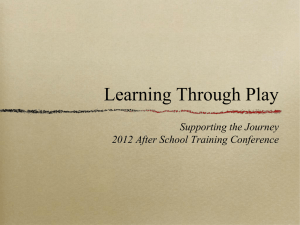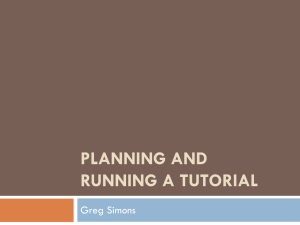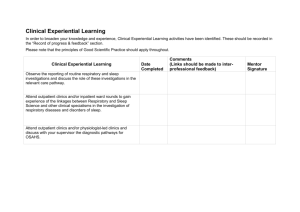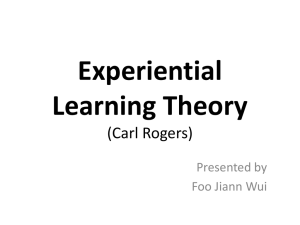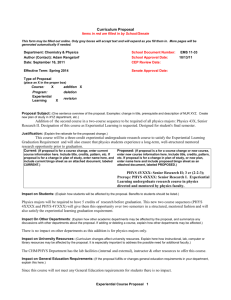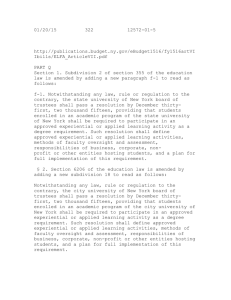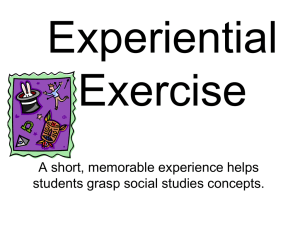Curriculum Proposal - Purdue University Calumet
advertisement
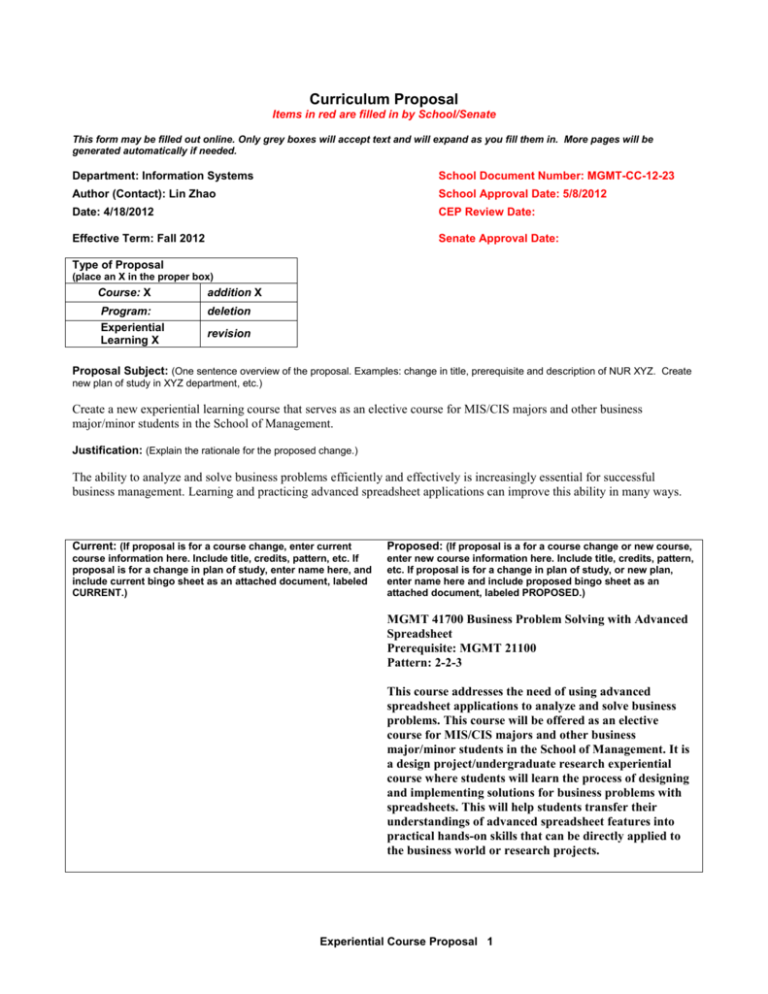
Curriculum Proposal Items in red are filled in by School/Senate This form may be filled out online. Only grey boxes will accept text and will expand as you fill them in. More pages will be generated automatically if needed. Department: Information Systems School Document Number: MGMT-CC-12-23 Author (Contact): Lin Zhao School Approval Date: 5/8/2012 Date: 4/18/2012 CEP Review Date: Effective Term: Fall 2012 Senate Approval Date: Type of Proposal (place an X in the proper box) Course: X addition X Program: Experiential Learning X deletion revision Proposal Subject: (One sentence overview of the proposal. Examples: change in title, prerequisite and description of NUR XYZ. Create new plan of study in XYZ department, etc.) Create a new experiential learning course that serves as an elective course for MIS/CIS majors and other business major/minor students in the School of Management. Justification: (Explain the rationale for the proposed change.) The ability to analyze and solve business problems efficiently and effectively is increasingly essential for successful business management. Learning and practicing advanced spreadsheet applications can improve this ability in many ways. Current: (If proposal is for a course change, enter current Proposed: (If proposal is a for a course change or new course, course information here. Include title, credits, pattern, etc. If proposal is for a change in plan of study, enter name here, and include current bingo sheet as an attached document, labeled CURRENT.) enter new course information here. Include title, credits, pattern, etc. If proposal is for a change in plan of study, or new plan, enter name here and include proposed bingo sheet as an attached document, labeled PROPOSED.) MGMT 41700 Business Problem Solving with Advanced Spreadsheet Prerequisite: MGMT 21100 Pattern: 2-2-3 This course addresses the need of using advanced spreadsheet applications to analyze and solve business problems. This course will be offered as an elective course for MIS/CIS majors and other business major/minor students in the School of Management. It is a design project/undergraduate research experiential course where students will learn the process of designing and implementing solutions for business problems with spreadsheets. This will help students transfer their understandings of advanced spreadsheet features into practical hands-on skills that can be directly applied to the business world or research projects. Experiential Course Proposal 1 Impact on Students: (Explain how students will be affected by the proposal. Benefits to students should be listed.) Students will be better prepared to succeed in solving business problems by integrating advanced spreadsheet applications with real world experiences. Impact On Other Departments: (Explain how other academic departments may be affected by the proposal, and summarize any discussions with other departments about the proposal. If adding or deleting a course, explain how other departments may be affected.) None Impact on University Resources: (Curriculum changes affect university resources. Explain here how instructional, lab, computer or library resources may be affected by the proposal. It is especially important to address the possible need for additional faculty.) Existing university faculty and labs would be used. Impact on General Education Requirements: (If the proposal fulfills or changes general education requirements in your department, explain this here.) N/A CEP Curriculum Document Form For Experiential Learning Courses Standards of Practice of the National Society for Experiential Education Experiential Course Proposal 2 Course MGMT 41700 Department Information Systems Standards of Practice. Please provide the information requested below for each of the eight standards of practice. 1. Intention – Intention represents the purposefulness that enables experience to become knowledge and is deeper than the goals, objectives, and activities that define the experience. Example: Content of course overview, purpose of the course, etc. Evidence (Type responses in grey boxes.) Please describe the INTENTION of the course. This course is designed to integrate experiential learning experience with advanced spreadsheet applications learned in previous courses. It will be offered as an elective to MIS/CIS majors/minors and other management major/minor students to understand the applications of advanced spread tools for business problem solving. The experiential component of the course will be the practice of advanced spreadsheet skills for problem solving in field projects or research projects. The purpose of this practice will be to help the students understand the process of designing and implementing solutions for business problems with spreadsheet. To sum up, the purpose of this course is two-fold: • In terms of a design project, it is imperative for business students to understand how to transfer their understanding of spreadsheet features into practical hands-on skills that can be directly applied to the business world. • In terms of undergraduate research, students could do an interdisciplinary research project that could combine advanced spreadsheet applications with the principles of other management disciplines (e.g. finance, accounting, and marketing), or other professional disciplines (e.g. nursing, education, since healthcare and education are viewed as important business sectors.) 2. Preparedness & Planning –Identified intentions are set as goals and specific objectives and activities are defined for the course. Example: Forms and syllabus standards operationalized/scheduled 3. Authenticity – The experience must have a real world context and/or be useful and meaningful in reference to an applied setting or situation. Example: Standard site proposal agreement with goals, tasks, application. Learning goals, tasks, application would be as determined by the course. 4. Reflection – The learner must test assumptions and hypotheses about the outcome of decisions and actions taken, then weigh the outcomes against past learning and future implications. Example: Dialogic group events, journals, surveys, etc. For CEP Use Only (Circle One) Yes No Please demonstrate how students will be academically PREPARED to participate in experiential learning. Students will be required to have a fundamental understanding of spreadsheet applications before they enter the phase of field projects. The prerequisites of this course will be MGMT 21100 Advanced Spreadsheet Applications for Business, with a minimum grade of C. The design projects/undergraduate research component will represent a percentage of the course to be determined during the analysis of the requirements. Therefore, there will be ample time planned to prepare the students for the experience. Yes No Please demonstrate how this course has specific real world context and/or is an out-of-class experience which is AUTHENTIC. Students will be assigned to a local company or a research site to practice according to their academic interests and career goals. The research project could be interdisciplinary with graduate students from different disciplines. Yes No Please demonstrate in specific ways how assignments provide students the opportunities to meaningfully REFLECT on their experience. • Discussions on technical and practical problems occurred in field projects or research projects will be facilitated on a discussion forum on Blackboard. • Each group will be required to submit weekly experiential learning activity reports as the experience progresses. Experiential Course Proposal 3 Yes No 5. Orientation & Training – Students, community partner(s), and faculty are prepared with important background information about each other and about the context and environment in which the experience will operate. Additionally, ongoing structural development should be addressed in an effort to increase the appreciation of the context and skill requirements of her/his work. Please demonstrate how students will be prepared for the experience through an ORIENTATION which is appropriate to the context. Orientation lectures will be included in the early sessions of the course to help students understand the background and process of experiential learning. Training lectures of basic and advanced spreadsheet features will be provided to help students refresh their knowledge learned from the prerequisite class. Yes No Example: Checklist form with skills, tasks, preparation acquired CEP Curriculum Document Form For Experiential Learning Courses Standards of Practice of the National Society for Experiential Education Course MGMT 41700 Department Information Systems Standards of Practice. Please provide the information requested below for each of the eight standards of practice. 6. Monitoring – A student-teachercommunity partner feedback loop related to learning intentions and quality objectives. The structure of the experience permits change in response to the implications of the feedback. Example: Checklist form with dates, review, consults, meetings, weekly student /instructor meetings, mid semester contact with site supervisor, etc. 7. Assessment & Evaluation – Assessment is a means to refine the specific learning goals and quality objectives identified during the planning stages of the experience. Evaluation provides comprehensive data about the experiential process as a whole and whether it has met the intentions. Example: Grades, reports, community partner or site evaluations, faculty evaluations, self-evaluations, performance reviews, student evaluations, etc. 8. Acknowledgment – All parties and individuals involved in the experience should be included in the recognition of progress and accomplishment. Example: Faculty summary reports, students ratings, site surveys, presentation of project to site, poster sessions, recognition of student on website, informal or formal gathering, Ex L Expo, transcript notation of experience, etc. Evidence (Type responses in grey boxes.) Please demonstrate how students will receive feedback and opportunities to improve their performance through effective MONITORING . The instructor will establish communications with local sites or research sites to assure participation on the part of students. The instructor will monitor the learning process of students by participating discussions, reviewing the weekly learning activity reports, and reviewing the spreadsheet designed by students. Please demonstrate how students will be ASSESSED and EVALUATED. • Each group is required to submit a weekly activity report with the actual spreadsheet that they designed so that the project progress can be monitored and assessed properly. • A final report will be required for each group to summarize their activities and findings from the projects. • A final group presentation on experiential learning experiences will be required for each group. • Students' performance on the local companies or research sites will be considered in determining students’ final grades of the course. Please show how students will be ACKNOWLEDGED for the learning they have experienced in this course. The local corporate partners, the research project partners, SOM faculty members, EXL committee members and EXL advisory board members will be invited to attend EXL students’ final presentations on experiential learning experiences. This could be expanded to a school-wide or university-wide conference for all experiential learning courses. Experiential Course Proposal 4 For CEP Use Only (Circle One) Yes No Yes No Yes No Type of Experience __ Cooperative Education __ Design Project __ Internship __ Cultural Immersion __ Practicum __ Undergraduate Research __ Service Learning Please indicate the type of Experiential Learning this course involves. Yes If more than one type applies, please indicate which is the PRIMARY (P) category and which is the SECONDARY (S). No Design Project (P), Undergraduate Research (S) Experiential Course Proposal 5

